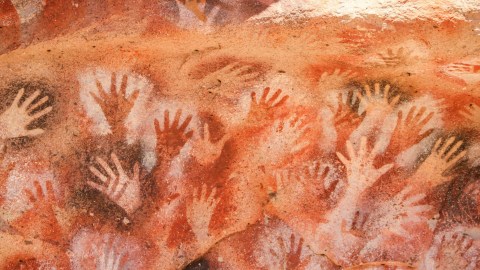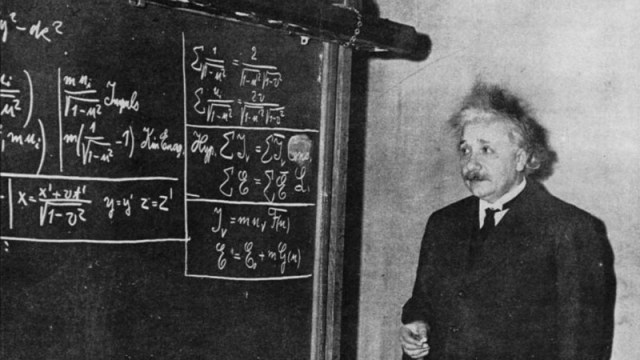Is self-actualization a biological need?

Shutterstock
- Maslow’s hierarchy of needs sets self-actualization apart from many of the “baser” needs, like needing food or belonging.
- However, research in evolutionary psychology suggests that self-actualization may not be so different after all.
- Instead, it may simply be another way of attaining status, ensuring that the self-actualized individual can acquire a mate and care for offspring.
Although his first paper on the subject was published nearly 80 years ago, Abraham Maslow’s hierarchy of needs remains a staple of positive and pop psychology. Frequently depicted as a pyramid, Maslow’s model argues that human beings are a driven species, constantly in pursuit of new goals. If we have food, then we are driven to acquire safety; if we have safety, then we are driven to acquire love and belonging; and then esteem; and finally, self-actualization.
Self-actualization, or the realization of one’s true potential, is almost invariably described as a lofty goal, a transcendence of one’s baser needs and motivations such that we get to pursue a refined, abstract purpose that only human beings have the spiritual capacity to pursue. But what if the desire to become self-actualized isn’t an entirely abstract pursuit? What if the desire for self-actualization is really just another way of acting out some hardwired biological behavior?
Psychology professor Douglas Kenrick and colleagues wanted to explore this question. “The traditional view of self-actualization saw it as somehow ‘above’ baser physiological and social desires — it sits on top of Abraham Maslow’s famous pyramid of needs,” Kenrick said in a statement.
“In fact, Maslow’s favorite examples of self-actualizing behaviors were going off to play the guitar or write poetry for your own satisfaction. … But if you take an evolutionary perspective on human behavior, it seems unlikely that our ancestors would have evolved to solve all the problems of survival, making friends, gaining status and winning mates, just to go off and entertain themselves.”
Instead, Kenrick and colleagues argue that the desire to pursue self-actualization is really just another way for us to satisfy ingrained biological imperatives.
Self-actualization and evolutionary psychology
But first, what really is self-actualization? Maslow asserted that baser needs, like satisfying hunger, took priority over higher ones, like social needs. But even once these needs were satisfied, he wrote,
“we may still often (if not always) expect that a new discontent and restlessness will soon develop, unless the individual is doing what he is fitted for. A musician must make music, an artist must paint, a poet must write, if he is to be ultimately happy. What a man can be, he must be. This need we may call self-actualization.”
But self-actualization may not be so distinct from those baser needs. In Kenrick and colleagues’ research, they found that most people conceived of self-actualization in way that suggested it was really just another approach to ensuring one’s genes could be passed down to the next generation.
Evolutionary psychology takes the position that no human behavior arises by accident; natural selection prunes our behaviors to ensure that only those that enable our genes to pass down remain. If you die of starvation, you’re not going to have much of a shot at finding a mate or care for any resulting offspring, so we are driven to find food. If you don’t feel fear or anxiety, dangerous predators might ambush you in the jungle, or you might fall off a cliff. If you don’t feel affection for your kin and want to take care of them, the closely related genomes they possess might not get passed on.
Based on this perspective, Kenrick and colleagues surveyed more than 1,200 people, asking them to reflect on what they would be doing if they were self-actualizing. Then, they asked the study participants to rate which “fundamental motives” were most reflected in their answers. These fundamental motives were developed based on Maslow’s hierarchy of needs but recast Maslow’s model according to an evolutionary psychology perspective. So, the participants were asked whether they thought their versions of self-actualization reflected fundamental motives like self-protection, affiliation (or finding friends/allies), mate acquisition, mate retention, disease avoidance, status-seeking, and caring for kin.
The results were clear. When asked what their version of self-actualization would be like, most people gave responses like “Getting a 4.0 and studying for my exams,” “If I were self-actualizing right now, I would have a job in performance — probably theater. I would be a successful, admired, wealthy stage actor, maybe on Broadway. I would also have many strong, close friendships,” and “I’d be writing the great American novel.” When asked to reflect on what fundamental motives they thought were reflected in these perceived versions of their self-actualized selves, most respondents indicated that status-seeking was the biggest component.
In evolutionary psychology, status-seeking plays an important role. Higher status individuals have a better shot at acquiring a mate, keeping that mate, and providing for any offspring. Thus, Kenrick and colleagues concluded that self-actualization wasn’t actually so distinct from the lower levels of Maslow’s hierarchy; instead, it was simply another way of fulfilling those “baser” needs.
What would Maslow think of this?
Maslow believed that only the lucky and driven few could attain self-actualization, so it’s likely the case that few if any of these individuals were self-actualized. When asked about their vision of what self-actualization would be like, the study respondents may have instead simply related under what circumstances the need they were feeling the most would be satisfied, confusing it for self-actualization. In Maslow’s hierarchy, status-seeking would likely fall under the need for esteem, which lies just beneath self-actualization.
To counter this, the study authors point out two important facts. First, Maslow pointed to several historical figures whom he believed had achieved self-actualization. Without exception, they were historical titans, high-status individuals like Abraham Lincoln and Albert Einstein. Under Maslow’s model, self-actualization doesn’t require an individual to have achieved high status. Rather, the natural motivation for self-actualization might encourage it. But his selection of only high-status historical figures suggests that status-seeking may indeed be the deeper motivation behind self-actualization.
This counter point is diminished somewhat by the fact that Maslow also studied several contemporaries of his that he knew personally. He simply didn’t want to publish their names. They could have been high-status individuals as well, but they could also have easily been humbler folk.
More compelling is the argument that functionally, it doesn’t matter whether the pursuit of self-actualization is the pursuit of status. A self-actualizing individual might not care for status at all, but the pursuit of self-actualization often results in status. If this desire for self-actualization is indeed hardwired into our genetics, then those who achieve it will have an easier time acquiring a mate and caring for offspring, resulting in that programming being passed on to future generations. Does this somehow debase the idea of self-actualization? Hardly. Instead, research such as this and evolutionary psychology merely grounds Maslow’s theory, bringing it closer to the realm of the empirical rather than the merely conceptual.





